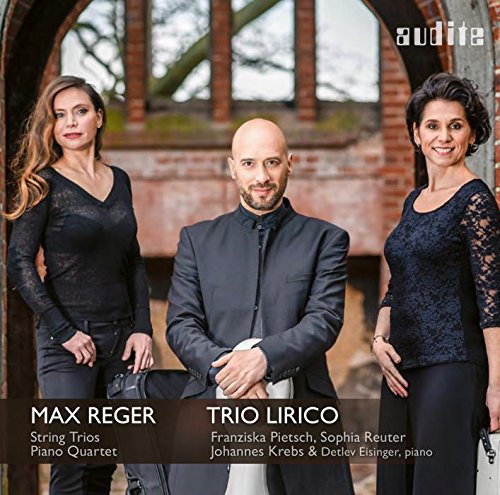REGER String Trios. Piano Quartet No 2
View record and artist detailsRecord and Artist Details
Composer or Director: (Johann Baptist Joseph) Max(imilian) Reger
Genre:
Chamber
Label: Audite
Magazine Review Date: 03/2018
Media Format: CD or Download
Media Runtime: 83
Mastering:
DDD
Catalogue Number: 97 714

Tracks:
| Composition | Artist Credit |
|---|---|
| String Trio |
(Johann Baptist Joseph) Max(imilian) Reger, Composer
(Johann Baptist Joseph) Max(imilian) Reger, Composer Trio Lirico |
| Piano Quartet No 2 |
(Johann Baptist Joseph) Max(imilian) Reger, Composer
(Johann Baptist Joseph) Max(imilian) Reger, Composer Detlev Eisinger, Piano Trio Lirico |
Author: Peter Quantrill
If the steam of dumplings still rises from Reger’s better-known chamber and orchestral music for some listeners – I’m rather partial to a dish of Griessklösschen myself – then they should find the calorie count more to their taste in the attenuated textures of the string trio, even in the more densely woven lines of Op 141b. The German Trio Lirico do a fine job of sounding more like a sextet, not without some effort caught by the microphones. Rival ensembles on Naxos and Gramola are also audibly taxed – somehow huffing and sighing are grist to the mill of the Regerian aesthetic – but I prefer the ebb and flow of the new recording, the opportunities for contrast and genial dialogue taken wherever they arise, such as in the serenade-like lilt of the first movement’s second theme.
The Second Piano Quartet is one of those several works composed after Reger had had a close encounter with a Brahmsian archetype (in this case the C minor Quartet, Op 60), and there is even a furtive tip of the hat to his exemplar at the start of the development section. Here again a sympathetic recording balance is key to the success of the performance, placing Detlev Eisinger’s contribution at a discreet distance while making clear that this is a partnership of musical equals.
Discover the world's largest classical music catalogue with Presto Music.

Gramophone Digital Club
- Digital Edition
- Digital Archive
- Reviews Database
- Full website access
From £8.75 / month
Subscribe
Gramophone Full Club
- Print Edition
- Digital Edition
- Digital Archive
- Reviews Database
- Full website access
From £11.00 / month
Subscribe
If you are a library, university or other organisation that would be interested in an institutional subscription to Gramophone please click here for further information.




